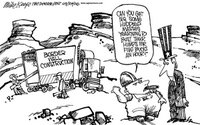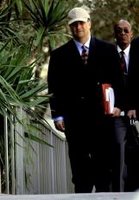
Tierney's take on illegal immigrants (see below) includes the belief that it is impossible to secure the borders, so why even try? For national security reasons, I find that position rather troubling, although I suspect it is more than a bit credible. And if it is true, how can we ever hope to protect ourselves from terrorists, let alone enforce legal immigration?
It seems to me (maybe I've been brainwashed by Lou Dobbs on CNN?) that both national security and immigration enforcement start with secure borders. Given George's statement, "When you make something illegal that people want, there's a way around it," how does he ever propose to keep the nation safe from terrorists slipping into our country?
Forgetting the terrorist issue for the present, let's suppose it is impossible to prevent undocumented people from entering our country. What would we do? Make criminals out of those who hire undocumented workers? Rat to the authorities on anyone who doesn't show a National ID Card at the Piggly Wiggly--and then have them thrown in jail along with their children? (Hello, Big Brother.)
It seems that the only thing worse than our inability to secure our borders would be the alternative scenario -- one that encroaches on civil liberties and starts to feel as paranoid creepy as the McCarthy era.
I don't know about you, but if that's the alternative, I'd say, figure out how to secure the borders--or let the tide roll in.

King Canute at the Border
By John Tierney
The New York Times
George Bush is the King Canute of the immigration debate, and I mean that in a nice way.
Canute has an image problem today because so many people think of him as that batty old English king who thought he could command the tide to recede. But that's the wrong spin on his legend.
In the original tale, he was a sensible ruler who was tired of hearing flattery from his courtiers about his great powers. When they told him that even the tides would obey his command, he went down to the sea to teach them a lesson in limits.
Today's courtiers are the Republicans in Congress and the others demanding that America "secure the border." They're furious at Bush for suggesting that a crackdown at the border will not stop the tide of illegal immigrants.
"When you make something illegal that people want, there's a way around it," he said, pointing out an inconvenient reality that would remain even if a 2,000-mile fence were built on the southern border. People would keep going under it, through it or around it to other borders.
The Border Patrol has tried building fences and adding thousands of agents, and in some places it has made smuggling harder. Yet the overall flow of immigrants hasn't slowed. No matter how hard they work, the agents can't outlaw basic economics.
In San Diego, for instance, agents took pride that their concentrated efforts had caused local smugglers to raise their fee to $1,500. But that's still a small price next to what immigrants stand to gain. Chinese immigrants are already paying $20,000 apiece to be smuggled into America.
It's the same kind of economic quandary that has stymied the war on drugs. For more than a quarter-century, federal and local authorities have tried to solve America's drug problem by making smuggling and dealing prohibitively expensive.
They've stepped up enforcement at the borders, promising that more agents and new technology would make a difference. They've taken the fight to countries supplying drugs. They filled prisons with dealers and addicts. But even though they raised the cost of smuggling and dealing, the increase was never enough to make a difference.
"Seizing drugs has not had any perceptible impact on the availability of drugs," says Peter Reuter, an economist at the University of Maryland who's an expert on drugs and other black markets. "Even though enforcement has gotten tougher by any measure, the prices of drugs have been falling steadily."
I'm not suggesting that stopping drugs is the same as stopping the flow of illegal immigrants. In many ways the drug war is easier because it enjoys more popular support. Most people would like to see less drug use. No one wants a drug market on the corner, and people will urge the police to round up dealers and addicts there.
They're not about to turn in the illegal immigrants working in their stores, their neighborhoods and their homes. They know how hard immigrants work and how much they contribute. They may tell pollsters there's too much immigration, but they like the immigrants they know.
Americans are understandably angry to see immigrants' breaking the law, but they're not going to be assuaged when a crackdown simply creates more illegality. The only practical way to reduce lawbreaking is to change the law so more immigrants can enter legally and the ones here can stop hiding, the approach favored by Bush and Senators John McCain and Edward Kennedy.
Some skeptics doubt that illegal immigrants want to come forward and start paying taxes. But most immigrants claim to be willing, at least according to a new survey of more than 200 undocumented workers in Los Angeles, Chicago and Miami conducted for the Manhattan Institute and the National Immigration Forum.
About 4 in 10 of them said they're already getting taxes deducted from their paychecks, and 70 percent said they'd be willing to pay back taxes to get legal status. More than 90 percent said they'd comply with other requirements, like paying a fine of $1,000, getting fingerprinted and submitting to a criminal background check.
Railing at them for breaking the law is not going to make them go home or stop others from following them here. Immigrants will cross the border one way or another. The more of them we let in legally, the better off everyone will be. Whether you welcome more immigrants, as I do, or whether you'd rather see fewer, there's no point in commanding the tide to ebb.
Photo credit: John Tierney. (Fred R. Conrad/The New York Times)
Related articles:
- "An Analytic Assessment of U.S. Drug Policy" by David Boyum and Peter Reuter. AEI Press, March 2005.
- "BORDER CONTROL: Available Data on Interior Checkpoints Suggest Differences in Sector Performance" Government Accountablility Office report, July 2005.
- "Borders Beyond Control" by Jagdish N. Bhagwati. Foreign Affairs, January/February 2003.
- "How To Reform Immigration Laws" by Benjamin Powell. The Independent Institute, March 30, 2006.
- Ringleader Gets 35-Year Term In Smuggling Of Immigrants (March 17, 2006)
- Dutch Investigating High Toll In Fire That Killed Detainees (October 28, 2005)
- National Briefing | South: Florida: Boy In Smugglers' Boat Dies (October 14, 2005)
- National Briefing | Southwest: New Mexico: A Mexican Border Village Is Razed (September 21, 2005)
- Commentary: Bush as King Canute - (United Press International) (January 26, 2005)
- The Blog | Marty Kaplan: King George and King Canute | The Huffington Post (February 17, 2006)
- The Blog | Jane Smiley: Surprise, Surprise! | The Huffington Post (April 1, 2006)
- AlterNet: Immigration 101 by Molly Ivins (March 30, 2006)
Technorati tags: John Tierney, New York Times, immigration, refugees, terrorists, national security, border security, smuggling, drug war, John McCain, Ted Kennedy, George W. Bush, Congress, news, commentary, op ed




























